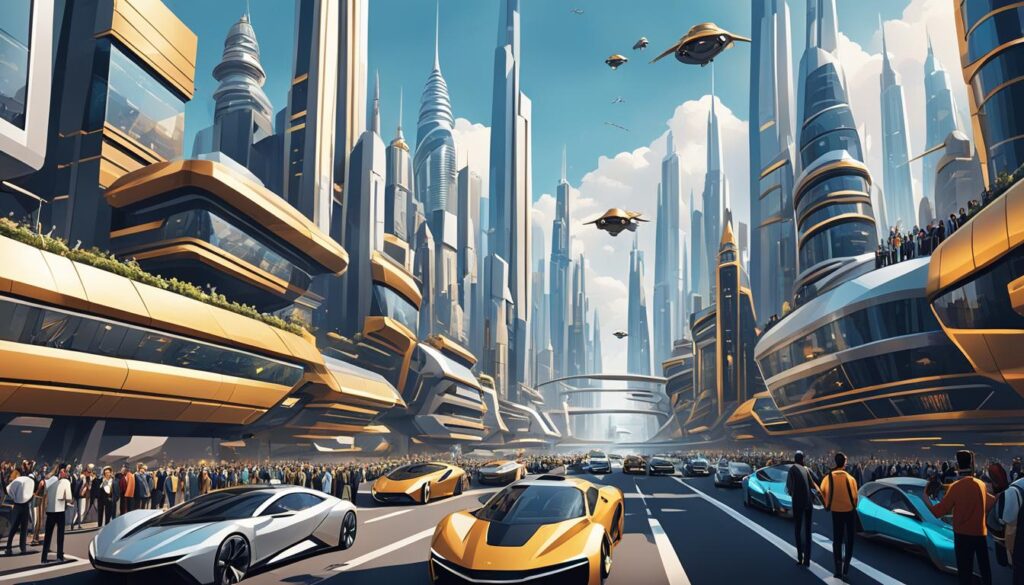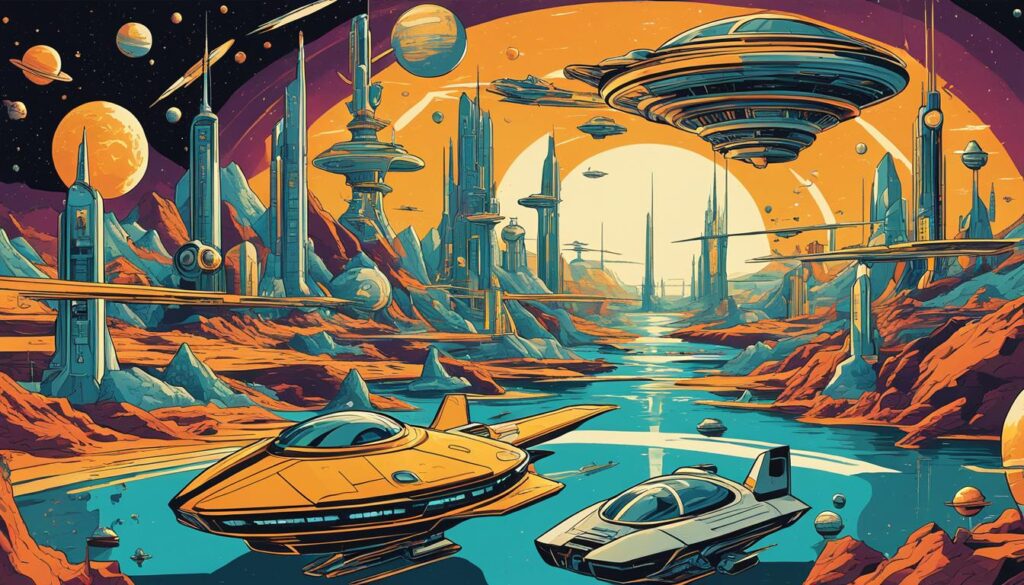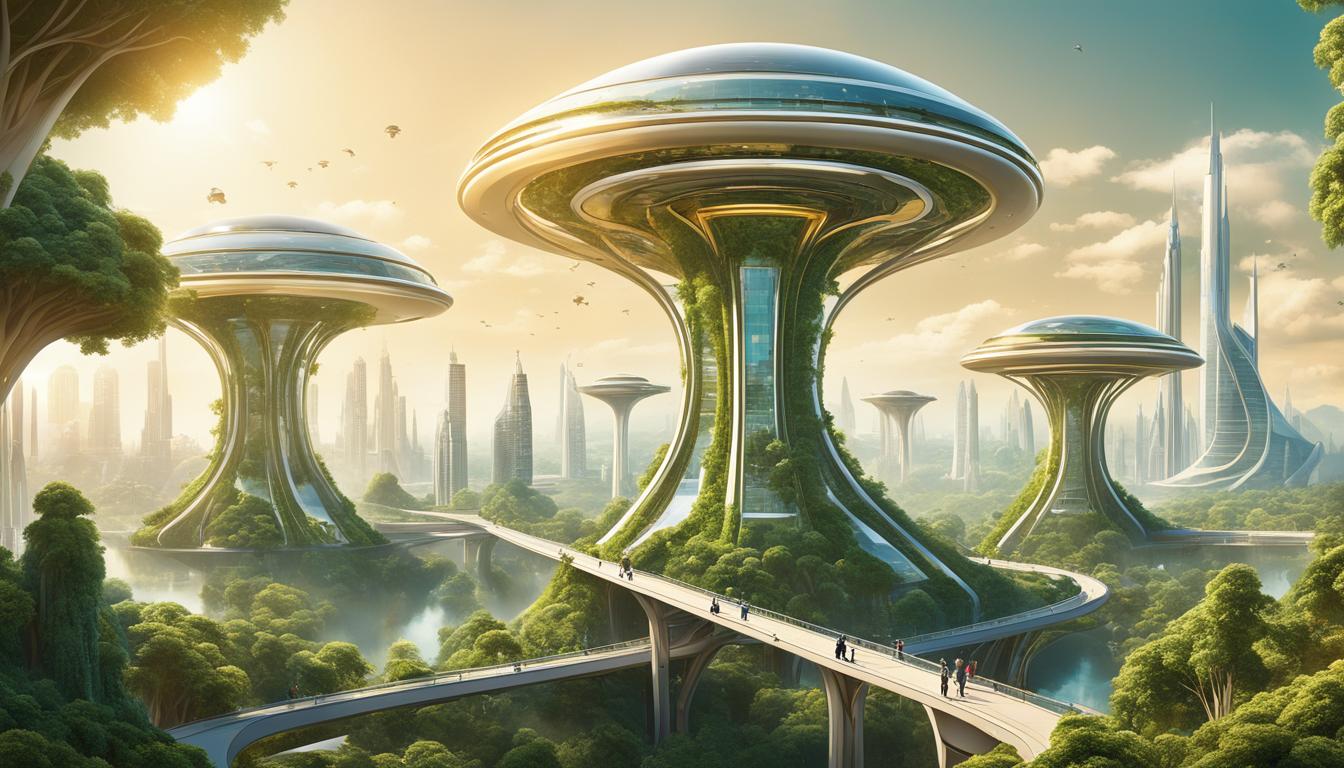“The Golden Age” by John C. Wright is a science fiction novel that takes readers on a journey to a futuristic world. The first book in the Golden Age series, this novel explores the idea of a utopian society, where humanity has conquered death and evolved into god-like beings.
The story follows the life of Phaethon, a man who is seeking to uncover the mysteries of his world, embarking on a mission to challenge the very foundations of society. With a unique blend of science and philosophy, “The Golden Age” presents a captivating vision of the future.
Key Takeaways:
- “The Golden Age” by John C. Wright is a science fiction novel that explores a futuristic world.
- The novel revolves around the character of Phaethon, who seeks to uncover the mysteries of his world and challenge societal norms.
- The book presents a unique combination of science and philosophy, making it a thought-provoking read.
- The Golden Age is the first book in the Golden Age series, and its intricate plot and well-developed characters offer a captivating journey for readers.
- Readers can expect to embark on a journey full of surprises, twists, and meaningful insights into human existence.
Introduction to “The Golden Age”
John C. Wright’s “The Golden Age” takes readers on a journey through a dazzling futuristic utopia. Set in the far-flung future, the book explores a society where technology has advanced to the point where death is no longer a concern for the wealthy elite.
John C. Wright is an American science fiction author known for his vivid world-building and complex characters. In “The Golden Age,” published in 2002, Wright immerses readers in a world where technology, politics, and human nature collide.
The premise of “The Golden Age” is centered around the idea that humanity has achieved a state of ultimate perfection. The book introduces us to Phaethon, a man who feels lost in the midst of an ideal society. His journey of self-discovery and rebellion against the status quo provides the perfect backdrop for Wright’s exploration of complex themes and ideas.
As we delve into the world of “The Golden Age,” we encounter grand ideas about the limits of technology, the nature of morality, and the search for individuality in a world of conformity. Wright’s book presents readers with a unique and thought-provoking vision of the future, and we can’t wait to take a closer look.
Plot Summary
Set in a distant future, “The Golden Age” by John C. Wright takes place in a utopian society named the Golden Oecumene, where humanity coexists with various artificial intelligences known as Sophotechs. The story focuses on the life of Phaethon, a celebrated hero who discovers that his memories have been tampered with, and he has unknowingly committed a crime against the Oecumene.
Desperate to uncover the truth, Phaethon embarks on a dangerous quest to regain his lost memories and clear his name. Along the way, he must confront various challenges, including betrayal, deceit, and political intrigue.
With the help of his loyal companions and advanced technology, Phaethon uncovers a sinister conspiracy that threatens the very existence of the Golden Oecumene. Can he save his society from destruction, or will his efforts be in vain?
The plot of “The Golden Age” is full of thrilling twists and turns, immersing readers in a suspenseful and action-packed narrative.
Main Characters
“The Golden Age” by John C. Wright features a diverse and complex cast of characters that drive the plot of the novel. Each character has a unique backstory, personality, and motivation that adds to the overarching narrative. Here is a profile analysis of the main characters in the book:
| Character Name | Profile |
|---|---|
| Phaethon Prime | Phaethon Prime is the protagonist of the novel, a mastermind inventor seeking to save humanity from an impending doom. He is highly intelligent, driven, and analytical, which sometimes causes him to be emotionally detached. |
| Helion | Helion is an enigmatic character in “The Golden Age.” He possesses a wealth of knowledge and experiences that make him both mentor and antagonist to Phaethon Prime. His allegiance to anyone is often unpredictable, making him an intriguing and complex figure in the narrative. |
| Ariadne | Ariadne is a smart and cunning character in “The Golden Age.” She is an expert in political maneuvering and is not afraid to use her beauty and charm to achieve her goals. Self-centered and ambitious, she is a formidable opponent to anyone she considers a rival. |
| Daphne | Daphne is a free-spirited character in the novel, who defies the norms of her society. She is an ardent supporter of Phaethon Prime and becomes his friend and confidant. Her optimism and desire for adventure make her an endearing character in the story. |
Through detailed character analysis and profiles, readers can gain a deeper understanding of the main characters in “The Golden Age.” From Phaethon Prime’s analytical mind to Ariadne’s political savvy, the cast of characters brings richness and texture to the novel’s futuristic world.
Setting and Worldbuilding
In “The Golden Age,” John C. Wright presents a detailed and immersive setting, showcasing a futuristic vision of humankind’s potential. The novel takes place in the far future, where humans have transcended their mortal limitations and have reached a state of godhood. The setting is meticulously crafted, with intricate details shaping a world that is both familiar and exotic.
One of the primary aspects of the novel’s setting is the technological advancements that allow humans to control and manipulate matter and energy at will. These innovations range from the nanotech that seamlessly integrates with the human body to the massive space habitats that feature entire ecosystems. Through these technologies, humans have created a post-scarcity society where resources are abundant, and the basic necessities of life are easily met.

The Golden Age’s worldbuilding features extraordinary societal structures, where the ruling class of post-humans attribute themselves to gods. The novel presents well-thought-out social hierarchies with the pharaoh-like god-kings who govern the world. This setting’s depth is manifested through the various peoples that populate the world, with diverse cultures and beliefs that underscore the novel’s themes.
John C. Wright’s worldbuilding highlights the idea that our visions of the future are shaped by our imaginations and technological aspirations. “The Golden Age” illustrates how humanity’s potential is limitless if we can harness the power of science and technology.
Themes and Messages
“The Golden Age” by John C. Wright presents a complex exploration of philosophical themes that invites readers to reflect on the human experience. The novel’s futuristic setting provides an imaginative backdrop for its exploration of universal issues such as the meaning of life, the nature of consciousness, and the limits of technology.
One of the key themes in “The Golden Age” is the tension between individualism and collectivism. The novel portrays a society in which the pursuit of personal desires and aspirations is balanced against the needs of the greater community. The protagonist, Phaethon Prime, embodies this tension as he struggles to reconcile his desire for self-determination with the social norms that govern his world.
Another recurring theme in the novel is the relationship between humans and technology. Wright uses the concept of mind design to explore questions of consciousness and self-awareness. Through the character of Helion, the novel invites readers to consider the ethical and moral implications of creating intelligent machines and the impact such technology might have on human society.
“The Golden Age” also explores the nature of reality and the limitations of human perception. The novel’s sophisticated worldbuilding invites readers to consider the possibility of multiple realities and the challenges inherent in comprehending the vastness of the universe.
Through its intricate themes and messages, “The Golden Age” offers a profound and thought-provoking exploration of the human experience. Wright uses the novel to pose challenging questions about the nature of existence and the role of technology in society, inviting readers to engage in deeper reflection about the world around them.
Writing Style and Structure
John C. Wright presents a highly imaginative and captivating novel in “The Golden Age,” with a prose that is rich and complex, yet accessible. The narrative structure follows a nonlinear path, with a nonlinear timeline that adds depth and complexity to the story. Wright masterfully balances exposition with action, avoiding lengthy infodumps and keeping the pace lively and engaging.
The novel’s prose is elegant and poetic, with vivid descriptions that bring the world to life. The author skillfully utilizes metaphors and similes to evoke emotion and create a powerful sensory experience for the reader. The use of descriptive language adds depth and nuance to the characters and the world they inhabit, making the story more immersive and memorable.
The novel’s narrative structure is well-crafted and helps to create a sense of intrigue and suspense. The story is told from the perspective of the protagonist, Phaethon, in the form of a first-person narrative. The nonlinear timeline provides insights into the protagonist’s backstory, revealing crucial details about his motivations and goals. The intricate and complex plot unfolds gradually, with unexpected twists and turns that keep readers on the edge of their seats.
In conclusion, John C. Wright’s “The Golden Age” showcases a superb writing style and a well-crafted narrative structure. The intricate prose analysis and masterful pacing make the reading experience a memorable one, immersing the reader in a vivid and imaginative world of the future.
Critical Reception
Since its release, “The Golden Age” has garnered significant critical acclaim from readers and experts alike. Many have praised John C. Wright’s imaginative world-building and intricate plot, lauding the novel as a standout in the science fiction genre.
One review from Kirkus Reviews described the book as “a stunning feat of imagination and storytelling,” while Publisher’s Weekly praised Wright’s “stylized, philosophical prose.”
However, there have been some mixed opinions regarding the book’s pacing and length. Some readers found the novel to be overly complex and challenging to follow, while others appreciated the depth and nuance of the narrative.
“Wright’s prose is dense, and his characters are not easily decipherable, but the journey is worth it for the payoff at the end.” – BookPage
Overall, “The Golden Age” has received high praise for its compelling storytelling, unique vision of the future, and thought-provoking themes.
Influence and Legacy
The impact of “The Golden Age” has been significant in shaping the science fiction genre. John C. Wright’s novel introduced readers to a futuristic universe where technology and humanity coexist, prompting new ways of thinking about the future. Its literary impact can be observed through its influence on subsequent science fiction works.
“The Golden Age” demonstrated the potential for science fiction to explore complex philosophical and societal issues in a compelling narrative. The novel’s exploration of themes such as transhumanism, post-scarcity, and the nature of consciousness, challenged readers to rethink their perspectives on humanity and the world around them.
“Wright’s Golden Age series is absolutely fantastic. Never before have I encountered such a detailed, complex, and interesting description of a utopian future.” – Brandon Sanderson, author of the “Mistborn” series
The novel’s cultural significance can also be observed through its influence on popular culture. Its intricate world-building and visionary concepts have inspired other media, including video games and film. The indelible mark left by “The Golden Age” on science fiction cannot be overlooked, and its legacy continues to inspire readers and writers alike.

Comparisons with Other Works by John C. Wright
John C. Wright is a prolific science fiction author, known for his imaginative worldbuilding, philosophical explorations, and intricate narrative structures. “The Golden Age” is one of his most notable works, but how does it compare to his other novels?
One of the similarities among John C. Wright’s works is his exploration of complex philosophical concepts. In “The Golden Age,” he delves into the meaning of human existence, the relationship between consciousness and reality, and the nature of morality. These themes are also present in other works such as “The Last Guardian of Everness” and “Count to a Trillion.”
Another shared element across Wright’s works is his attention to detail and vivid descriptions. He creates intricate worlds and technologies, immersing readers in his imagined universes. This is evident in “The Golden Age,” as well as in “The Architect of Aeons” and “Titans of Chaos.”
However, some differences can be found among Wright’s works. For instance, while “The Golden Age” and “Count to a Trillion” explore similar philosophical concepts, the narrative structures differ greatly. “The Golden Age” relies on complex plot twists and revelations, while “Count to a Trillion” employs a nonlinear narrative.
“John C. Wright’s works contain a unique blend of science fiction, philosophy, and mythology. While ‘The Golden Age’ is often considered his magnum opus, readers can find similar themes and worldbuilding in his other novels.”
Overview Table: Comparing “The Golden Age” with Other Works by John C. Wright
| Novel | Similarities | Differences |
|---|---|---|
| “The Last Guardian of Everness” | Philosophical exploration, attention to detail | Less complex narrative structure |
| “Count to a Trillion” | Philosophical exploration | Nonlinear narrative structure |
| “The Architect of Aeons” | Attention to detail, vivid descriptions | Less emphasis on philosophical themes |
| “Titans of Chaos” | Attention to detail, vivid descriptions | Less emphasis on philosophical themes, nonlinear narrative structure |
Adaptations and Spin-Offs
“The Golden Age” has captured the imaginations of readers with its futuristic vision and engaging storytelling. As a result, the book has garnered interest for potential adaptations and spin-offs in other media formats.
While there have been no official announcements for a film or television adaptation, fans have speculated on the possibilities of bringing “The Golden Age” to the screen. Some have suggested that the intricate plot and well-developed characters could translate well to a serialized format on streaming platforms. Others have visualized a big-budget blockbuster that showcases the novel’s futuristic worldbuilding and action sequences.
In addition to potential visual adaptations, “The Golden Age” has also inspired related merchandise, including fan art, collectible figurines, and t-shirts bearing quotes or images from the book. These items are popular among dedicated fans of the series, highlighting the lasting impact of “The Golden Age” on the science fiction community.
Comparison Table: Potential Adaptations of “The Golden Age”
| Adaptation Type | Potential Pros | Potential Cons |
|---|---|---|
| Film | High production value, widespread exposure, diverse casting options | Risk of oversimplifying plot and characters, deviation from source material |
| TV Series | More time to explore plot and characters, potential for ongoing storytelling, opportunity for diverse casting | Risk of low ratings or cancellation, potential for lack of budget/production value |
| Video Game | Interactive storytelling, potential for exploration of futuristic worldbuilding, opportunities for player choice and consequences | Risk of lack of mainstream appeal, difficulty in adapting complex narrative to gameplay mechanics |
Reader’s Opinion and Personal Reflections
What did you think of “The Golden Age” by John C. Wright? Did the futuristic setting and profound themes captivate you, or did you find it lacking in certain areas? We invite you to share your personal reflections and thoughts on the novel in the comments below.
“The Golden Age” is a thought-provoking journey through a meticulously crafted world. The themes of mortality, identity, and human purpose are explored in a way that keeps the reader engaged and invested in the story. The characters are well-developed, each with their unique motivations and conflicts. Personally, I found the ending to be particularly satisfying, as it tied up loose ends without feeling forced.”
What about you? What specific aspects of the book resonated with you, and why? Did you connect with any of the characters on a personal level? We look forward to hearing your opinions and engaging in thoughtful discussion.
Conclusion
In conclusion, “The Golden Age” by John C. Wright is a remarkable work of science fiction that offers a captivating vision of the future. Through its intricate plot and well-developed characters, the novel engages readers in a thought-provoking journey through an imaginative world. The book has received critical acclaim for its themes, writing style, and worldbuilding, and its influence on the science fiction genre is undeniable.
Readers have praised the book for its philosophical explorations and social commentary, as well as its exciting plot twists and vivid descriptions. Despite being published over a decade ago, “The Golden Age” remains a relevant and compelling read for fans of science fiction.
Whether you are new to the book or revisiting it after years, “The Golden Age” promises to entertain and inspire readers with its rich storytelling and imaginative world. It is a must-read for anyone looking to explore the fascinating possibilities of science fiction literature.



